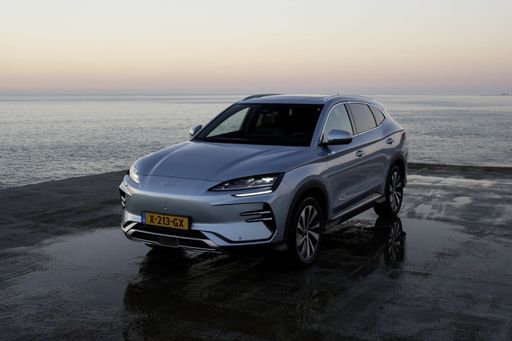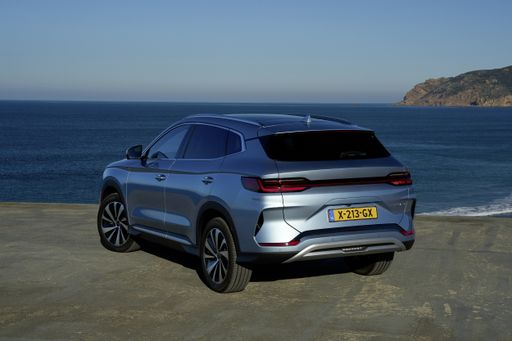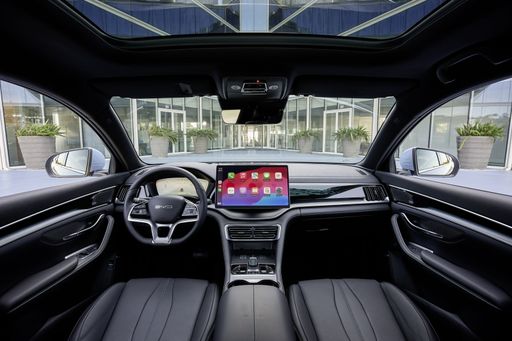BYD Seal U vs Toyota Prius - Differences and prices compared
Compare performance (324 HP vs 223 HP), boot space and price (34300 £ vs 39400 £ ) at a glance. Find out which car is the better choice for you – BYD Seal U or Toyota Prius?
Costs and Efficiency:
Looking at overall running costs, both models reveal some interesting differences in everyday economy.
BYD Seal U has a somewhat advantage in terms of price – it starts at 34300 £ , while the Toyota Prius costs 39400 £ . That’s a price difference of around 5143 £.
Fuel consumption also shows a difference: BYD Seal U manages with 0.40 L and is therefore noticeable more efficient than the Toyota Prius with 0.50 L. The difference is about 0.10 L per 100 km.
As for electric range, the BYD Seal U performs convincingly better – achieving up to 500 km, about 414 km more than the Toyota Prius.
Engine and Performance:
Under the bonnet, it becomes clear which model is tuned for sportiness and which one takes the lead when you hit the accelerator.
When it comes to engine power, the BYD Seal U has a distinct edge – offering 324 HP compared to 223 HP. That’s roughly 101 HP more horsepower.
In acceleration from 0 to 100 km/h, the BYD Seal U is a bit quicker – completing the sprint in 5.90 s, while the Toyota Prius takes 6.80 s. That’s about 0.90 s faster.
In terms of top speed, the BYD Seal U performs barely noticeable better – reaching 180 km/h, while the Toyota Prius tops out at 177 km/h. The difference is around 3 km/h.
Space and Everyday Use:
Cabin size, boot volume and payload all play a role in everyday practicality. Here, comfort and flexibility make the difference.
Both vehicles offer seating for 5 people.
In curb weight, Toyota Prius is a bit lighter – 1620 kg compared to 1940 kg. The difference is around 320 kg.
In terms of boot space, the BYD Seal U offers convincingly more room – 552 L compared to 284 L. That’s a difference of about 268 L.
When it comes to payload, BYD Seal U barely noticeable takes the win – 410 kg compared to 375 kg. That’s a difference of about 35 kg.
Who wins the race in the data check?
The BYD Seal U sits well ahead of its rival in the objective data comparison.
This result only shows which model scores more points on paper – not which of the two cars feels right for you.
Costs and Consumption
View detailed analysis
Engine and Performance
View detailed analysis
Dimensions and Body
View detailed analysis

BYD Seal U
BYD Seal U
The BYD Seal U pairs a sleek fastback silhouette with a surprisingly roomy, tech-rich cabin, giving electric chic without the showroom pretension. It's a smart pick for buyers after confident handling, sensible practicality and standout value — all wrapped up with a cheeky grin when you put your foot down.
details


Toyota Prius
The Prius glides through traffic like a wise commuter's secret weapon, balancing miserly running costs with an unflappable sense of reliability. It's not a thrill seeker, but its roomy cabin, sensible packaging and low-stress driving personality make it a brilliant choice for buyers who value peace of mind over pulse-raising performance.
details



Costs and Consumption |
|
|---|---|
|
Price
34300 - 39800 £
|
Price
39400 - 45800 £
|
|
Consumption L/100km
0.4 - 1.2 L
|
Consumption L/100km
0.5 - 0.7 L
|
|
Consumption kWh/100km
19.9 - 20.5 kWh
|
Consumption kWh/100km
-
|
|
Electric Range
70 - 500 km
|
Electric Range
72 - 86 km
|
|
Battery Capacity
-
|
Battery Capacity
-
|
|
co2
0 - 26 g/km
|
co2
12 - 17 g/km
|
|
Fuel tank capacity
60 L
|
Fuel tank capacity
40 L
|
Dimensions and Body |
|
|---|---|
|
Body Type
SUV
|
Body Type
Hatchback
|
|
Seats
5
|
Seats
5
|
|
Doors
5
|
Doors
5
|
|
Curb weight
1940 - 2147 kg
|
Curb weight
1620 - 1630 kg
|
|
Trunk capacity
425 - 552 L
|
Trunk capacity
284 L
|
|
Length
4775 - 4785 mm
|
Length
4599 mm
|
|
Width
1890 mm
|
Width
1782 mm
|
|
Height
1668 - 1670 mm
|
Height
1470 mm
|
|
Max trunk capacity
1440 - 1465 L
|
Max trunk capacity
-
|
|
Payload
410 kg
|
Payload
365 - 375 kg
|
Engine and Performance |
|
|---|---|
|
Engine Type
Plugin Hybrid, Electric
|
Engine Type
Plugin Hybrid
|
|
Transmission
Automatic
|
Transmission
Automatic
|
|
Transmission Detail
CVT, Reduction Gearbox
|
Transmission Detail
CVT
|
|
Drive Type
Front-Wheel Drive, All-Wheel Drive
|
Drive Type
Front-Wheel Drive
|
|
Power HP
218 - 324 HP
|
Power HP
223 HP
|
|
Acceleration 0-100km/h
5.9 - 9.6 s
|
Acceleration 0-100km/h
6.80 s
|
|
Max Speed
170 - 180 km/h
|
Max Speed
177 km/h
|
|
Torque
300 - 550 Nm
|
Torque
-
|
|
Number of Cylinders
4
|
Number of Cylinders
4
|
|
Power kW
160 - 238 kW
|
Power kW
164 kW
|
|
Engine capacity
1497 - 1498 cm3
|
Engine capacity
1998 cm3
|
General |
|
|---|---|
|
Model Year
2024
|
Model Year
2023
|
|
CO2 Efficiency Class
B, A
|
CO2 Efficiency Class
B
|
|
Brand
BYD
|
Brand
Toyota
|
What drive types are available for the BYD Seal U?
The BYD Seal U is available as Front-Wheel Drive or All-Wheel Drive.
